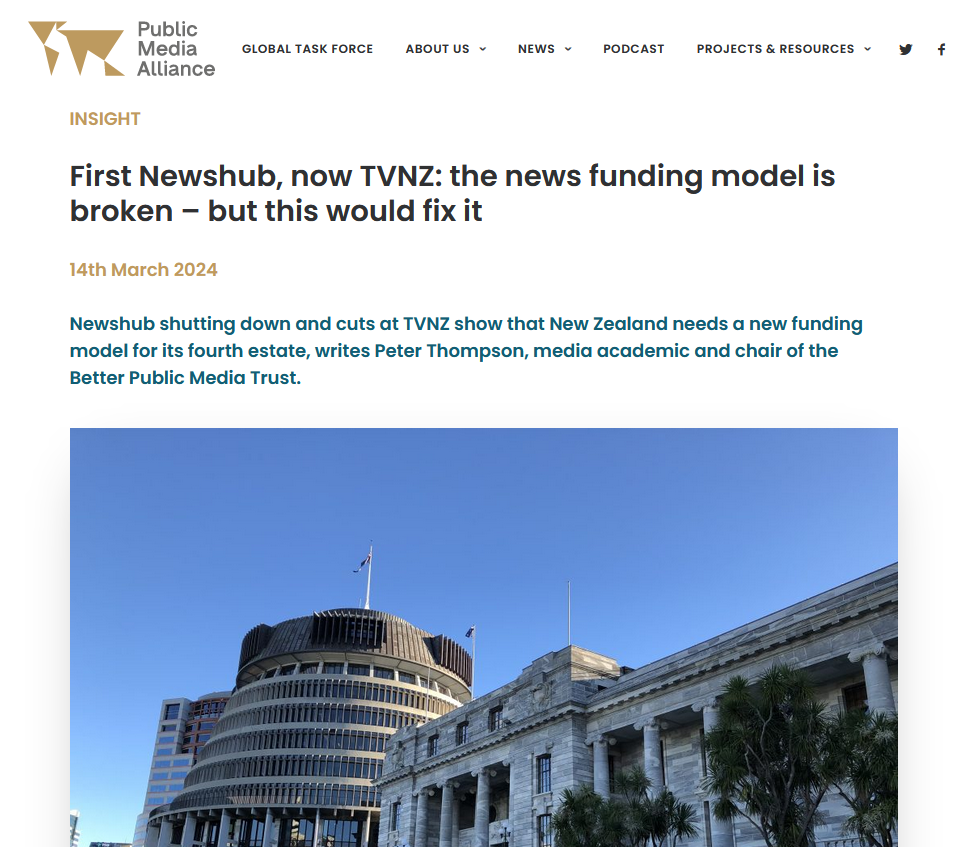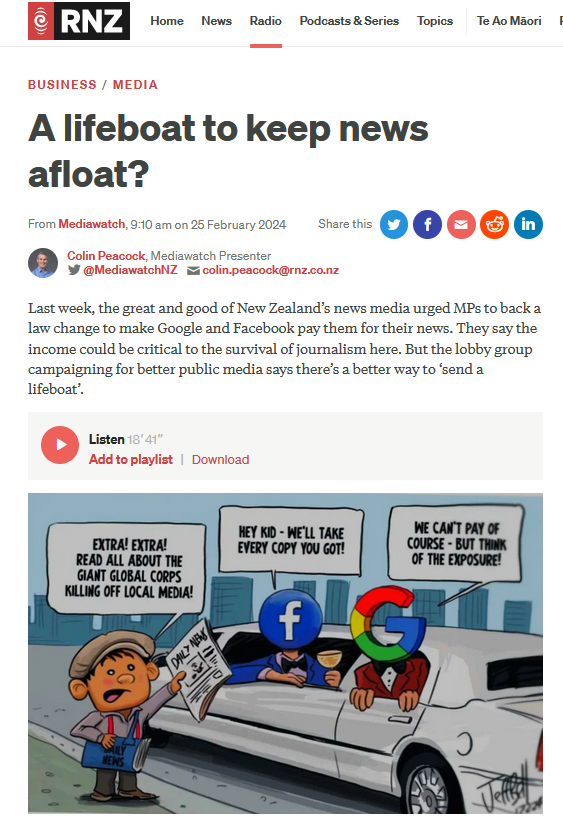Kia ora
It’s been a busy time at Better Public Media Trust and we have lots to tell you, our wonderful members and supporters.
AGM and Public Meeting
Our AGM is being held via Zoom on Sunday, 28 April. We’ll have a public meeting at 4pm prior to the formalities including speakers from across the public media sphere discussing the various current issues. Then the AGM, open only to paid-up members, will be at 5.30pm.
We’ll keep you informed as we firm up the details but if you’re interested keep the date free.
Cuts to RNZ and NZ On Air funding
We are deeply concerned about proposed funding cuts to RNZ and NZ On Air of 6%. The government has signaled that not only do these organisations which already run on the smell of an oily rag have to find efficiencies worth 6% of their annual operating budget, but they will also have 6% less funding for content. Such a cut to public media funding is appalling and the complete opposite of what Aotearoa NZ needs. 
With misinformation at an all-time high, the media production industry on its knees after cuts at TVNZ and Three (Warner Brothers Discovery), and both organisations with hefty bills to cover infrastructure costs, such cuts are little more than an attack on public media and the audiences it aims to serve.
RNZ in particular is still struggling with outdated and crumbling transmission infrastructure while aiming to deliver to broader local audiences. A cut to funding now is a step back in time.
Charity
After success at the Court of Appeal, we are now a registered charity which means that your donations are all tax deductible. In fact, your old donations are also tax deductible. Our charity status has been backdated to begin on 19 April 2015 when we first applied for charity status.
If you’re not a paid-up member, now is a good time to make it official. It’s only $40 ($20 unwaed) and we need all the support we can get as we go up against the well-funded forces for commercial media. The link is here on our home page. Please join.
BPM in the news
You may have seen Better Public Media Trust in the news after the news of cuts at TVNZ broke. It is gratifying that after years of hard work, we are now considered a reliable source of commentary on behalf of Aotearoa NZ media audiences. Our Chair, Peter Thompson was also featured in the newsletter of the Public Media Alliance, the international union of public media organisations.
It’s not just BPM. Our solution of a levy to strengthen public media has been taken up by SPADA, Peter Griffin for the Listener, and maybe even the Minister of Media and Communications, Melissa Lee. In a recent report into the Minister’s Cabinet paper being held up by NZ First, it was revealed that it included suggestions to consider other forms of media funding including a levy. We’re always hopeful that good sense will prevail and sustainable funding of Aotearoa NZ’s public media is established via a levy. It’s worth remembering, it needn’t cost the government a cent, yet could provide a Kiwi equivalent of the BBC or ABC.
Research
Among the bad news of cuts to our fourth estate, and the seemingly inexorable rise of populism against good sense, decency and human dignity, Research NZ released some recent findings that show Kiwis do care a lot about the importance of news and current affairs on television and online. Remember that next time you’re on Facebook and see only comments by seemingly rabid haters and culture warriors.
Update from the Chair
The news that TVNZ would be cutting 68 jobs and canning iconic local programmes such as Fair Go came barely a week after Warner Brothers Discovery (the owners of TV3, Bravo, Eden, and Rush) had announced that it was closing its news operation, Newshub as part of a cost-cutting restructure.
These decisions have come as a shock to some, but only if you weren’t paying attention. They are really the predictable culmination of the commercial logics which have been in play since the deregulation of the media sector from 1989 onwards.
The traditional business models of commercial TV news rested on the ability to monetise a mass audience and sell their eyeballs to advertisers. What that means in practice is that every programming and scheduling decision has to be justified in terms of ratings and revenue.
Structural inevitability
BPM members old enough to remember BCNZ will know that that commercial logic has engendered an approach to the audience which caters to the lowest common denominator and seems allergic to depth and substance. Such pressures have only intensified as audiences have fragmented thanks to new online/on-demand services and the lion’s share of digital advertising has been captured by the big tech platforms and social media.
For a short while between 2008 and 2012 we had the commercial-free TVNZ6 and TVNZ7 with a full hour of ad-free news and a 15-20 minute in-depth discussion of a topical issue. The contrast with One News and Newshub could scarcely be greater. Could we ever hope to return to such a model?
In principle, this is possible, but it would need both significant public funding and a new model of public service news. The problem is that under the new government, there is no appetite for such an approach. Melissa Lee, the Minister for Media and Communication, vehemently opposed Labour’s bill to establish a new public media entity encompassing both RNZ and TVNZ and inject over $100m a year into the industry. It wasn’t perfect, but it offered a model for the digital future of public television.
Minister Lee now is left with a conundrum. The government owns TVNZ but its business model is declining. Programmes like Fair Go are not even making a loss. They just aren’t making as much profit as a programme that is cheaper to produce in the same slot. But if TVNZ is going to casually dispense with the only such consumer affairs programme we have, along with Sunday which is New Zealand’s last primetime current affairs show, then it has abandoned any vestigial pretence to be interested in serving the public as citizens. With it goes any legitimate claim to government support.
The Fair Digital News Bargaining Bill
And it’s not just TVNZ and Warner Bros Discovery in trouble. The entire news sector is lobbying the government to progress a bill introduced under Labour obliging the big tech companies like Meta and Google to negotiate deals to pay news providers for hosting/sharing their news on their platforms.
The Fair Digital News Bargaining Bill is well-intentioned. When a single company like Google accounts for two thirds of the digital advertising market (roughly $1.2b out of $1.8b) and pays a pittance in taxes, it’s hard to have much sympathy when they are asked to support the domestic news sector. But the bill is also flawed (see BPM’s submission to the select committee). Although it will throw the news companies a few crumbs from Mark Zuckerberg’s table, it won’t deliver the outcomes the public need. Most significantly, the news bargaining scheme cannot guarantee that the revenue will go into supporting the kinds of public interest news that is at risk in this hyper-commercialised market. We need a different model.
Better Public Media Trust has a better idea. We’d like to see a levy imposed on a wide range of commercial media revenues, starting with digital advertising. Just a 1% levy on digital advertising would provide as much revenue as the now defunct Public Interest Journalism Fund which NZ On Air administered on a contestable basis. That saw support for a wide range of news and journalism such as local journalism, investigative reporting and news reflecting minority perspectives which could not be achieved under a commercial model.
A levy model could also be extended to streaming services like Netflix and Disney+ to generate revenue to support quality local content. Telecoms and internet services providers are already subject to a small levy, the TDL which funded rural broadband. This could be reinstated back to previous levels. And if we applied a levy to audiovisual retail (e.g. television, computer and phone sales) we could generate enough revenue to de-commercialise TVNZ or set up a multi-platform public service publisher to showcase quality Kiwi content of all kinds including in-depth news and current affairs. New Zealanders who have given up on local content would finally have a reason to turn on the television if there’s decent news, current affairs, documentaries, kids programmes, comedy and drama to watch.
Such a plan may be good for audiences but also faces vested interests across the commercial sector which are more concerned with keeping their shareholders and advertisers happy than serving the public interest. And we have a government which thus far has no policies and no indication of commitment to addressing any of the many, growing problems. If anything, the Minister seems to have gone into hiding.
So what can we do?
- If you want to save Fair Go, Sunday and other TVNZ programmes up for the chop, E tū Union is challenging TVNZ management’s decision with a Save Our Stories petition you can sign here – https://www.together.org.nz/save_our_stories
- You can write to the Minister of Media and Communication and ask her to implement levies to support public media provisions and prevent commercial pressures from dictating what’s on our screens. Write to Melissa Lee M.Lee@ministers.govt.nz. Do be polite and constructive!
- If you want to write to Newshub and offer them support, their contact email is news@newshub.co.nz
- You can contact TVNZ and ask them to save Fair Go and Sunday. The contact email and phone-numbers are here – https://corporate.tvnz.co.nz/contact/
Ngā mihi
The Trustees




